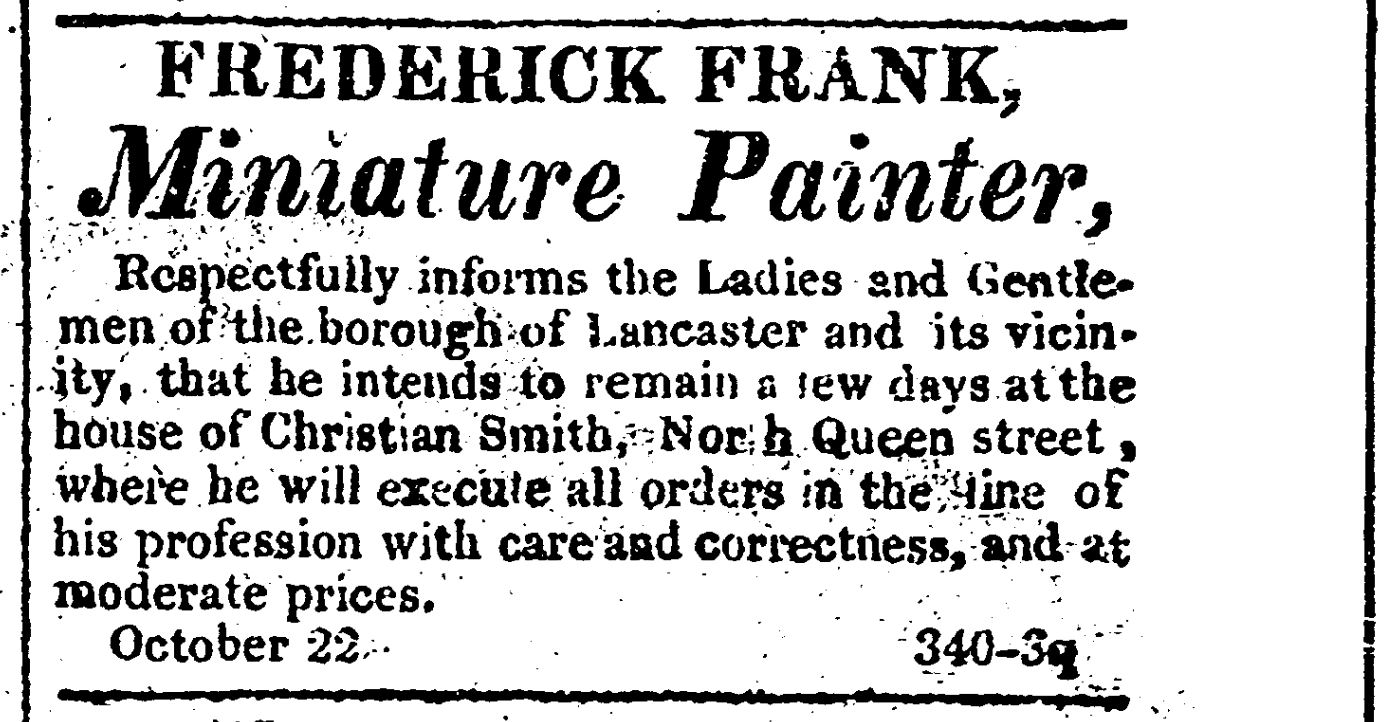Citation
Chicago:
Blythe Sobol, “Unknown, Portrait of a Man, ca. 1830,” catalogue entry in Aimee Marcereau DeGalan, Blythe Sobol, and Maggie Keenan, The Starr Collection of Portrait Miniatures, 1500–1850: The Collections of the Nelson-Atkins Museum of Art, vol. 1, ed. Aimee Marcereau DeGalan (Kansas City, MO: Nelson-Atkins Museum of Art, 2024), https://doi.org/10.37764/8322.5.3228.
MLA:
Sobol, Blythe. “Unknown, Portrait of a Man, ca. 1830,” catalogue entry. Aimee Marcereau DeGalan, Blythe Sobol, and Maggie Keenan. The Starr Collection of Portrait Miniatures, 1500–1850: The Collections of the Nelson-Atkins Museum of Art, edited by Aimee Marcereau DeGalan, vol. 1, Nelson-Atkins Museum of Art, 2024. doi: 10.37764/8322.5.3228.
Catalogue Entry
This miniature of an unknown man was previously attributed to William M. S. Doyle (1769–1828), a prominent and prolific Boston-based portraitist who worked in silhouettes, miniatures, and pastel.1Carrie Rebora Barratt and Lori Zabar, American Portrait Miniatures in the Metropolitan Museum of Art (New York: Metropolitan Museum of Art, 2010), 72. However, there are reasons to believe that Doyle was not the artist of this particular miniature. The style lacks the finesse commonly found in Doyle’s work or that of William Lewis (1788–after 1838), another miniature painter who was active in New England around the same time and whose miniatures, like Doyle’s, bear some superficial resemblance to this example.2Dale T. Johnson, American Portrait Miniatures in the Manney Collection (New York: Metropolitan Museum of Art, 1990), 145–46. For conservator Carol Aiken, this distinction is key: the miniature is similar to the works of Lewis and Doyle, but neither Lewis nor Doyle painted it. Carol Aiken, 2017–18, NAMA curatorial files. Nevertheless, it is possible that the artist responsible for this miniature was familiar with their works.
One notable difference lies in the choice of materials. While Doyle and Lewis typically painted on expensive ivory: The hard white substance originating from elephant, walrus, or narwhal tusks, often used as the support for portrait miniatures., this miniature was executed on a paper support, a more economical medium. The pressed and gilded tin case closely resembles examples made in the 1830s in Reading, Pennsylvania, a town about sixty miles northwest of Philadelphia.3On the “competitive inland Pennsylvania market” for portraits in the first decades of the nineteenth century, see Thomas R. Ryan, ed., The Worlds of Jacob Eicholtz: Portrait Painter of the Early Republic (Lancaster, PA: Lancaster County Historical Society, 2003), 64. Additionally, the attire of the sitter suggests a possible date of about 1825 to 1830, making it less likely to have been by either Doyle’s or Lewis’s hands.4Carol Aiken, 2017–18, NAMA curatorial files.
The paint surface of the miniature has suffered some abrasion over time, making it challenging to determine the identity of either the artist or the sitter, who was likely a man in his twenties or thirties, perhaps a member of the upwardly mobile middle class. He wears a brown coat and a jaunty striped waistcoat, most likely his finest clothes. His coat does not have the puffed shoulders that were fashionable from about 1825 to 1835,5Harper Franklin, “1830–1839,” FIT Fashion History Timeline, April 3, 2020, https://fashionhistory.fitnyc.edu/1830-1839. but he may have been a man of simpler tastes, or he may have lived in a more provincial town where cosmopolitan fashions were slow to take effect.

The sitter may have commissioned this miniature from a local or, more likely, itinerant miniaturist to commemorate an engagement or a career milestone. Much has been written about the artists who worked their way up and down the east coast of the United States, but many of them remain unknown, their miniatures unidentified in various storerooms across the country. Clues to their identities may be found in the newspaper advertisements they published to promote their work as they moved from town to town (Fig. 1).
Notes
-
Carrie Rebora Barratt and Lori Zabar, American Portrait Miniatures in the Metropolitan Museum of Art (New York: Metropolitan Museum of Art, 2010), 72.
-
Dale T. Johnson, American Portrait Miniatures in the Manney Collection (New York: Metropolitan Museum of Art, 1990), 145–46. For conservator Carol Aiken, this distinction is key: the miniature is similar to the works of Lewis and Doyle, but neither Lewis nor Doyle painted it. Carol Aiken, 2017–18, NAMA curatorial files.
-
On the “competitive inland Pennsylvania market” for portraits in the first decades of the nineteenth century, see Thomas R. Ryan, ed., The Worlds of Jacob Eicholtz: Portrait Painter of the Early Republic (Lancaster, PA: Lancaster County Historical Society, 2003), 64.
-
Carol Aiken, 2017–18, NAMA curatorial files.
-
Harper Franklin, “1830–1839,” FIT Fashion History Timeline, April 3, 2020, https://fashionhistory.fitnyc.edu/1830-1839.
Provenance
Mr. John W. (1905–2000) and Mrs. Martha Jane (1906–2011) Starr, Kansas City, MO, by July 16, 1992 [1];
Their gift to The Nelson-Atkins Museum of Art, Kansas City, MO, 1992.
[1] In a memorandum from museum director Marc Wilson to curator Eliot Rowlands dated July 16, 1992, Wilson writes, “I am pleased to learn that Mrs. Starr would like to make a gift of the miniature which Robin Bolton-Smith of the National Museum of American Art has attributed to William M.S. Doyle (1769–1828).” Note that the miniature has since been de-attributed. See NAMA curatorial files.
No known exhibitions, related works, or references at this time. If you have additional information on this object, please tell us more.